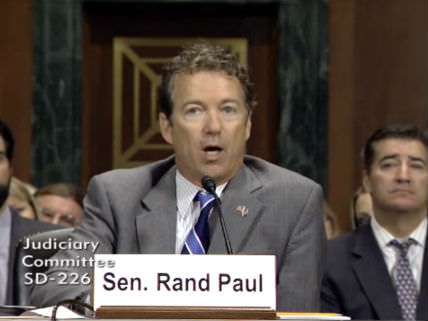On Sentencing Reform, Are Libertarian-Leaning Republicans Joining Holder, or Is It the Other Way Around?

A story that ran on the front page of yesterday's New York Times describes an "unlikely" alliance between Attorney General Eric Holder and libertarian-leaning Republicans that "may make politically possible the most significant liberalization of sentencing laws since President Richard M. Nixon declared war on drugs." The Times is right that the alliance is significant, but its gloss on the motivation of Sen. Rand Paul (R-Ky.) and other Republican reformers is a bit misleading:
For Mr. Holder, addressing sentencing laws is central to a second-term agenda that also includes defending voting rights and same-sex marriage. Black Americans have disproportionately received lengthy prison terms and are extremely overrepresented in the inmate population.
Libertarian-minded Republicans see long prison sentences as an ineffective and expensive way to address crime.
Shorter version: Holder wants justice, while Republicans are in it for the money. Yet Paul has passionately and eloquently condemned the injustices caused by mandatory minimum sentences. At a Senate hearing last September, he said:
The injustice of mandatory minimums is impossible to ignore when you hear the stories of the victims….There is no justice here. It is wrong and needs to change.
During the same hearing Paul highlighted the racially disproportionate impact of mandatory minimums:
If I told you that one out of three African-American males is [prohibited] by law from voting, you might think I was talking about Jim Crow, 50 years ago. Yet today a third of African-American males are still prevented from voting because of the war on drugs. The war on drugs has disproportionately affected young black males. The ACLU reports that blacks are four to five times more likely to be convicted for drug possession, although surveys indicate that blacks and whites use drugs at about the same rate. The majority of illegal drug users and dealers nationwide are white, but three-fourths of the people in prison for drug offenses are African American or Latino.
Paul took up the same theme in an April 2013 speech at Howard University. Furthermore, the sentencing reform bill that Paul and Sen. Patrick Leahy (D-Vt.) introduced last March goes farther than the bill approved by the Senate Judiciary Committee in January, which is the one the Obama administration is backing. The Paul-Leahy bill, known as the Justice Safety Valve Act, would effectively make mandatory minimums optional, authorizing judges to depart from them in the interest of justice. By contrast, the Smarter Sentencing Act, introduced by Sens. Richard Durbin (D-Ill.) and Mike Lee (R-Utah) last July, would make the 2010 reductions in crack sentences retroactive, cut the mandatory minimums for certain drug offenses in half, and loosen the criteria for the "safety valve" that allows some defendants to escape mandatory minimums. Those are important reforms, but they are substantially less ambitious than the change proposed by Paul, who told the Senate Judiciary Committee, "I am here to ask that we begin today the end of mandatory minimum sentencing."
In short, while Holder deserves credit for decrying and seeking to ameliorate the harm caused by our excessively punitive criminal justice system, he does not have a monopoly on sympathy for people who do not belong in prison, outrage at their predicament, or concern about the relationship between skin color and draconian sentences. If anything, Paul's record on these points is stronger.
Looking beyond sentencing policy, the civil libertarian credentials of Paul and several of his Republican allies are also impressive, especially when compared to the Obama administration's. The Times notes that they "have accused the Obama administration of trampling on personal freedom with drones, wiretaps, tracking devices and too much government." In fact, "Some Republicans say that they are the ones being consistent on matters of protecting liberties, and that Mr. Holder's push for changes to the sentencing laws is a step in their direction, not the other way around."
